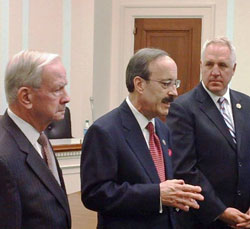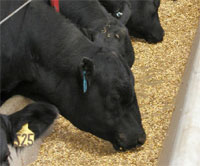Get out your 2012 calendars and mark the date for just under a year from now to attend the next global event to help increase exports of ethanol co-products for livestock feed.
 Once again, the U.S. Grains Council (USGC) and the Renewable Fuels Association (RFA) are teaming up for the Export Exchange 2012, an international trade conference focused on the export of U.S. coarse grains and co-products, including distiller’s dried grains with solubles (DDGS) and corn gluten. The last such event was held last year about this time in Chicago.
Once again, the U.S. Grains Council (USGC) and the Renewable Fuels Association (RFA) are teaming up for the Export Exchange 2012, an international trade conference focused on the export of U.S. coarse grains and co-products, including distiller’s dried grains with solubles (DDGS) and corn gluten. The last such event was held last year about this time in Chicago.
“Export Exchange 2010 was a huge success,” said Wendell Shauman, USGC chairman. “People from all around the world gathered in one central location to make deals and get information regarding these vital commodities. Business contacts made during the conference are still being used today.”
Export Exchange 2012 will be held Oct. 22-24 at the Minneapolis Marriott City Center. Additional information will be posted at www.exportexchange.org as it develops.


 A jury in the US District Court for the Western District of Wisconsin determined that Novozymes patent is valid and ordered Danisco to pay damages of more than $18 million for infringement. The jury also found Danisco’s infringement to be willful but the jury’s decision is still subject to the judge’s affirmation and possible appeals.
A jury in the US District Court for the Western District of Wisconsin determined that Novozymes patent is valid and ordered Danisco to pay damages of more than $18 million for infringement. The jury also found Danisco’s infringement to be willful but the jury’s decision is still subject to the judge’s affirmation and possible appeals. Outlining his priorities for farm policy this week, Agriculture Secretary Tom Vilsack stressed the need for continued support of renewable fuels in the next farm bill.
Outlining his priorities for farm policy this week, Agriculture Secretary Tom Vilsack stressed the need for continued support of renewable fuels in the next farm bill. As a part of the national
As a part of the national  The No. 33 Richard Childress Racing Chevrolet race car will feature a special-edition American Ethanol paint scheme at the race and will be driven by American Ethanol spokesman and
The No. 33 Richard Childress Racing Chevrolet race car will feature a special-edition American Ethanol paint scheme at the race and will be driven by American Ethanol spokesman and  The two congressmen, pictured here with former National Security Advisor Robert McFarlane, outlined their Open Fuel Standard Act (HR 1687) which would set a deadline of 2017 for automakers to stop making cars that run on only gasoline. After than point, all American made cars must be either flex fuel (capable of burning gasoline, ethanol or methanol or any combination of these), or powered by natural gas, hydrogen, biodiesel, plug-in electric, or fuel cell.
The two congressmen, pictured here with former National Security Advisor Robert McFarlane, outlined their Open Fuel Standard Act (HR 1687) which would set a deadline of 2017 for automakers to stop making cars that run on only gasoline. After than point, all American made cars must be either flex fuel (capable of burning gasoline, ethanol or methanol or any combination of these), or powered by natural gas, hydrogen, biodiesel, plug-in electric, or fuel cell.  A research team discovered that when corn stover is processed to make ethanol, three distinct parts of it – the rind, pith and leaves – break down in different ways.
A research team discovered that when corn stover is processed to make ethanol, three distinct parts of it – the rind, pith and leaves – break down in different ways. ZeaChem has raised $19 million in Series C financing, led by Birchmere Ventures, and partner Sean D.S. Sebastian has joined the ZeaChem board of directors. “As an industry leader in the advanced biofuels and bio-based chemicals industries, ZeaChem’s proven capability to produce economical and sustainable petroleum alternatives is an innovation we are pleased to add to our portfolio,” said Sebastian.
ZeaChem has raised $19 million in Series C financing, led by Birchmere Ventures, and partner Sean D.S. Sebastian has joined the ZeaChem board of directors. “As an industry leader in the advanced biofuels and bio-based chemicals industries, ZeaChem’s proven capability to produce economical and sustainable petroleum alternatives is an innovation we are pleased to add to our portfolio,” said Sebastian. 
 According to the report by USDA’s Economic Research Service (ERS), “We found that, on average, for the past 5 crop years (2006/07-2010/11), 1 mt of distillers’ grains substitutes for about 1.22 mt of corn and soybean meal combined in the United States.”
According to the report by USDA’s Economic Research Service (ERS), “We found that, on average, for the past 5 crop years (2006/07-2010/11), 1 mt of distillers’ grains substitutes for about 1.22 mt of corn and soybean meal combined in the United States.”